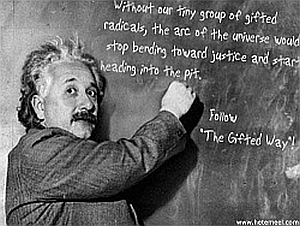A true story. Sam and Dave (that’s the only untruth because they’re not their real names) went to the same English private school. They had very similar, very high IQs. They were both recognized by their teachers as having outstanding potential.
Sam went on to Cambridge University, became President of the Union, a Conservative MP and eventually a minister in Margaret Thatcher’s Cabinet. Dave rejected academia and left school totally confused, without a clue what to do for a living. It took several decades of experiment before he found his feet.
Conformist or creative?
How come two boys with such similar intellectual resources and training grounds could end up so differently?
Part of the answer lies with their families but another part lies with their natures.
Sam was deeply conformist. He saw that his path to success lay in accepting the status quo and working within it. He rejoiced in his vision and embraced it with gusto.
Dave challenged everything. He saw the inconsistencies, the illogical choices and outright hypocrisy that prevailed on the conformist path. He could not see a way forward that also possessed integrity.
This was not a matter of conscious choice. Sam could no more challenge the existing rule than Dave could avoid questioning it. Sam would fight to support the dominant authority. Dave could only support that which made intellectual sense.
In the terms of giftedness, Sam is a gifted conformist while Dave is a gifted creative.
Comfort and joy?
If you are gifted, your chances of achieving a life of comfort and ease are greatly enhanced if you are conformist. This study shows why:
In the 1960s, E. Paul Torrance, head of the Bureau of Educational Research at the University of Minnesota, began studying creativity. His focus was on school children but his discoveries will be recognized by many gifted adults who’ve experienced being ‘selected out’ throughout their lives.

A gifted creative justifies the gifted way
Teachers, he discovered, do not like creative children. They prefer the child of high intelligence and low creativity. This child is not a rebel and completes school assignments with dispatch and perfection.
Creative children, on the other hand, “seem to be playing around when they should be working at assigned tasks. They engage in manipulative and/or exploratory activities, many of which are discouraged or even forbidden.
“They enjoy learning, and this looks to the teacher like play rather than work. They are intuitive and imaginative: enjoy fantasy; see unusual uses in ordinary objects; are flexible, inventive, original, perceptive and sensitive to problems. They have vital energy.”
Torrance found that 70 percent of the children who rated high in creativity would not be selected to be members of a special class for intellectually gifted children even if their test scores warranted it. They annoy teachers who see them as not serious or dependable.
Could do better if . . .
These children are the perennial recipients of the: “Could do better ” award. They are the ones who make discipline hard, not from malice but from brightness. They are the ones whose witty answers to prosaic questions make the class laugh and drive their teachers to distraction.
If you’re like me you’re already warming to the idea of these bright kids. However, Torrance was a pragmatist and wrote: “It is evident that many of them [creative children] bring upon themselves many of their woes. Obviously, one task of education is to aid such children to become less obnoxious without sacrificing their creativity.”
It strikes me that this response was well-meaning but a bit half-hearted. I would rather suggest that the gifted creative adult allow him or herself to be “obnoxious” (to use Torrance’s word, which I wouldn’t) but be ready to accept the inevitable isolation and hostility that goes with it.
Creative autodidact
Very few schools are up to the task of teaching according to their students’ needs rather than the teachers’. This is partly because of lack of resources but also due to lack of will. (Educationalists have done some great work on differentiating individual learning approaches but they seem to overlook their own discoveries when it comes to lesson planning.)
However, once you’re away from the learn-test-forget environment of formal education you can put your good-humored creativity and passion for the truth to good service as a creative autodidact. After all, as the great creative genius Albert Einstein said: “ The only thing that interferes with my learning is my education”.
Not bad, just buttoned up
It’s obvious that my leaning is toward the creatively gifted. Otherwise I’d be a retired senior civil servant living in a grace and favor home in the UK’s Windsor Great Park.

Not really blind, just gifted but buttoned up
However, I do feel a lot of compassion for the gifted conformists. Their commitment to the status quo means that they cannot contribute to change but in my experience they often feel quite conflicted about their position.
Their intellects, often developed to a high level of rigor by their profession, cannot easily overlook the defects in the systems they support and thrive within. This means they are forced to live by phrases such as: “That’s just human nature.” to explain their co-existing with the venality of many of their peers.
And, of course, they externalize their inherent need for natural justice by establishing the mechanisms of judgment at various levels: by examination, by professional body, by law, etc.
In this way, they find a comfortable place of limbo, hanging between a radical commitment to ‘truth’ and a pragmatic acceptance of societal imperfection. Interestingly, they are often more radical in their extra-curricula activities, supporting contemporary arts, liberal governments and even causes such as organic farming and the greening of the nation. Thus they find balance.
In my time of youthful innocence I assumed that every thinking person was a natural-born radical but had had it trained out of them. I no longer think this is true of all. However, many gifted conformists do turn in later life to develop those aspects of their inner lives which they had carefully put aside “for the sake of their careers.”
It is never too late to draw riches from the mine of the soul. Never too late to open the doors to the gifted creative within. You just have to give yourself permission.
I was lucky in school – I was educated by nuns who “beat” obedience into you – there was no such thing as the class clown or creativity – it was work and more work and more work – you learned the lessons no matter what, were quiet in class and never, ever asked questions. If a child dared ask a question, the isolationi and hostility began. So asking questions to avoid the pain of corporal punishment was simply not done. Lots and lots of activities allowed creative outlets outside of school.
In university, conformity to the prof’s ideologies was it – being creative, going outside the “papers” world got you a C at best and an F if you happen to quote findings of professionals actually doing the job, not just researching. So to get an A I was told by another student meant proving the prof’s notions – I found it stifling but I wanted my degree.
As an adult, invitations for input resulted in isolation and hostility – either from the boss or from peers – so creativity was not welcomed there either. Conformity and, as in university, adopting the boss’s point of view – and never, ever diverting from that position. Each and every piece of input had to “fit the boss’s notions” – creativity – outside the box thinking – and change were no nos.
Eventually, the inner self rebels – the world comes down on you like a ton of bricks – the world does see you as “obnoxious” because you are not towing the line! And though some souls empathize and would like to go for the ride with you, they have families to think about and keeping the job and the pension is everything. Isolation results.
In the end, you are almost alone – just one or two people stick it out with you because very few people treasure the gifts you have – and depression and despair – being lost – is the result.
For such a great “gift”, the price is high!
It’s been my experience that freedom is available but you have to watch for your chances. There’s a self part that calculates how much creativity I can “get away with” in any given situation. It requires incessant reading of people and cultures, lots and lots of observation, but over time I’ve acquired enough information to find the “slack” in many a tight spot.
Sometimes the only freedom is in my thoughts and perceptions, but that can be enough. There are friends across centuries and continents who’ve left artifacts.
At least that’s what I think when I’m calm. When I’m in distress, I feel wild impatience, rage, despair, grief.
“It’s all part of life’s rich pageant.”